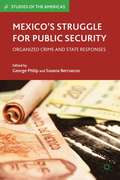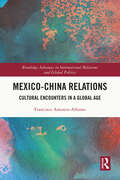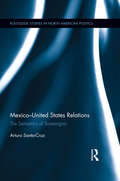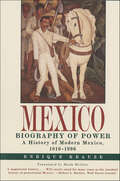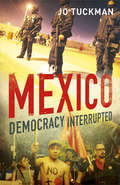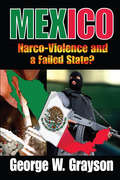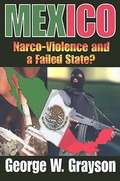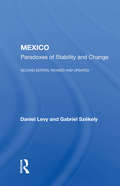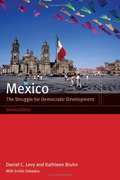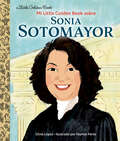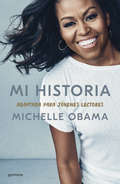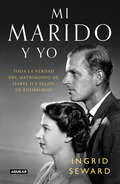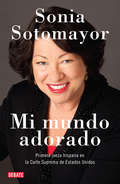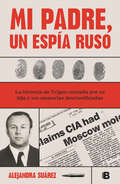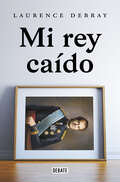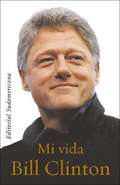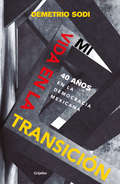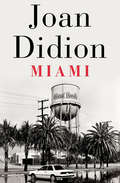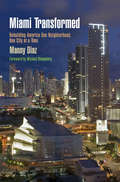- Table View
- List View
Mexico's Struggle for Public Security
by George Philip Susana BerruecosThe Mexican government's full-frontal attack on the powerful drugs cartels has achieved mixed results. This book considers the issue from a variety of viewpoints. The essential argument is that the organized crime is best combated by institutional reforms directed at strengthening the rule of law rather than by a heavy reliance on armed force.
Mexico-China Relations: Cultural Encounters in a Global Age (Routledge Advances in International Relations and Global Politics)
by Francisco Antonio-AlfonsoThis book analyses contemporary Mexico-China relations as a complex cultural encounter.Through an unprecedented analysis of the discursive production of a series of diplomatic, media and academic sources, this book demonstrates how, embedded in the great technological and political transformations of our transition into the 21st century, Mexico-China relations embodied a complex process of knowledge formation, confronting their socially constructed conceptions of time, space and otherness: a cultural encounter. The book advances the idea that the cultural encounter between Mexico and China provides a fundamental case for understanding world politics and human interaction from a truly global perspective and beyond reductionist views of reality. Unlike previous works, which have predominantly focused on economics or geopolitics – strongly influenced by a realist approach – the book will present the subject as a dynamic interaction between ideological and material factors.Mexico-China Relations contributes to the study of otherness construction and critical understanding of the non-Western world in international relations (IR). It will appeal to researchers and students of IR theory, political theory, cultural studies and studies of the impact of cultural influences on foreign policy, as well as professionals working on Sino-Latin American relations.
Mexico-United States Relations: The Semantics of Sovereignty (Routledge Studies in North American Politics)
by Arturo Santa-CruzSovereignty is a key factor to consider when studying the Mexico-United States relationship. During most of the twentieth century, as a result of the new character of the Mexican post-revolutionary regime, there was a decoupling between the state’s maximalist discourse on sovereignty, and its practice. Sovereignty as an undifferentiated whole does not exist; it should instead be disaggregated into the myriad issue areas in which it is constantly negotiated. Focusing on a tripartite classification relating to the construction of Mexico’s sovereignty towards its northern neighbor since 1920, this volume illustrates how Mexico’s sovereignty has varied not only according to the times, but also according to the issues at stake. In doing so, Arturo Santa-Cruz comprehensively covers a variety of issues in the bilateral agenda such as drug trafficking, electoral observation, human rights, investment, migration, security, and trade, as well as some defining moments in the relationship, such as the 1923 US granting of recognition to the Mexican post-revolutionary regime, the 1938 oil nationalization, the 1982 debt crisis, and the 1995 financial bailout. These diverse cases, analyzed through an original analytical approach, capture sovereignty’s multifocal meaning.
Mexico: A History of Modern Mexico, 1810–1996
by Enrique KrauzeThe concentration of power in the caudillo (leader) is as much a formative element of Mexican culture and politics as the historical legacy of the Aztec emperors, Cortez, the Spanish Crown, the Mother Church and the mixing of the Spanish and Indian population into a mestizo culture. Krauze shows how history becomes biography during the century of caudillos from the insurgent priests in 1810 to Porfirio and the Revolution in 1910. The Revolutionary era, ending in 1940, was dominated by the lives of seven presidents -- Madero, Zapata, Villa, Carranza, Obregon, Calles and Cardenas. Since 1940, the dominant power of the presidency has continued through years of boom and bust and crisis. A major question for the modern state, with today's president Zedillo, is whether that power can be decentralized, to end the cycles of history as biographies of power.
Mexico: Democracy Interrupted
by Jo TuckmanIn 2000, Mexico's long invincible Institutional Revolutionary Party (PRI) lost the presidential election to Vicente Fox of the National Action Party (PAN). The ensuing changeover—after 71 years of PRI dominance—was hailed as the beginning of a new era of hope for Mexico. Yet the promises of the PAN victory were not consolidated. In this vivid account of Mexico's recent history, a journalist with extensive reporting experience investigates the nation's young democracy, its shortcomings and achievements, and why the PRI is favored to retake the presidency in 2012. Jo Tuckman reports on the murky, terrifying world of Mexico's drug wars, the counterproductive government strategy, and the impact of U. S. policies. She describes the reluctance and inability of politicians to seriously tackle rampant corruption, environmental degradation, pervasive poverty, and acute inequality. To make matters worse, the influence of non-elected interest groups has grown and public trust in almost all institutions—including the Catholic church—is fading. The pressure valve once presented by emigration is also closing. Even so, there are positive signs: the critical media cannot be easily controlled, and small but determined citizen groups notch up significant, if partial, victories for accountability. While Mexico faces complex challenges that can often seem insurmountable, Tuckman concludes, the unflagging vitality and imagination of many in Mexico inspire hope for a better future.
Mexico: Financial Sector Assessment Program Update--Detailed Assessment of Compliance with the Basel Core Principles for Effective Banking Supervision and Transparency of Banking Supervision
by International Monetary FundA report from the International Monetary Fund.
Mexico: Financial Sector Assessment Program Update--Detailed Assessment on the Implementation of the IOSCO Objectives and Principles of Securities Regulation
by International Monetary FundA report from the International Monetary Fund.
Mexico: Narco-Violence and a Failed State?
by George W. Grayson* Mexico was named an Outstanding Academic Title of 2010 by Choice Magazine.Bloodshed connected with Mexican drug cartels, how they emerged, and their impact on the United States is the subject of this frightening book. Savage narcotics-related decapitations, castrations, and other murders have destroyed tourism in many Mexican communities and such savagery is now cascading across the border into the United States. Grayson explores how this spiral of violence emerged in Mexico, its impact on the country and its northern neighbor, and the prospects for managing it.Mexico's Institutional Revolutionary Party (PRI) ruled in Tammany Hall fashion for seventy-nine years before losing the presidency in 2000 to the center-right National Action Party (PAN). Grayson focuses on drug wars, prohibition, corruption, and other antecedents that occurred during the PRI's hegemony. He illuminates the diaspora of drug cartels and their fragmentation, analyzes the emergence of new gangs, sets forth President Felipe Calderi?1/2n's strategy against vicious criminal organizations, and assesses its relative success. Grayson reviews the effect of narcotics-focused issues in U.S.-Mexican relations. He considers the possibility that Mexico may become a failed state, as feared by opinion-leaders, even as it pursues an aggressive but thus far unsuccessful crusade against the importation, processing, and sale of illegal substances.Becoming a failed state involves two dimensions of state power: its scope, or the different functions and goals taken on by governments, and its strength, or the government's ability to plan and execute policies. The Mexican state boasts an extensive scope evidenced by its monopoly over the petroleum industry, its role as the major supplier of electricity, its financing of public education, its numerous retirement and health-care programs, its control of public universities, and its dominance
Mexico: Narco-violence and a Failed State?
by George W. Grayson* Mexico was named an Outstanding Academic Title of 2010 by Choice Magazine. Bloodshed connected with Mexican drug cartels, how they emerged, and their impact on the United States is the subject of this frightening book. Savage narcotics-related decapitations, castrations, and other murders have destroyed tourism in many Mexican communities and such savagery is now cascading across the border into the United States. Grayson explores how this spiral of violence emerged in Mexico, its impact on the country and its northern neighbor, and the prospects for managing it. Mexico's Institutional Revolutionary Party (PRI) ruled in Tammany Hall fashion for seventy-nine years before losing the presidency in 2000 to the center-right National Action Party (PAN). Grayson focuses on drug wars, prohibition, corruption, and other antecedents that occurred during the PRI's hegemony. He illuminates the diaspora of drug cartels and their fragmentation, analyzes the emergence of new gangs, sets forth President Felipe Calder�n's strategy against vicious criminal organizations, and assesses its relative success. Grayson reviews the effect of narcotics-focused issues in U. S. -Mexican relations. He considers the possibility that Mexico may become a failed state, as feared by opinion-leaders, even as it pursues an aggressive but thus far unsuccessful crusade against the importation, processing, and sale of illegal substances. Becoming a "failed state" involves two dimensions of state power: its scope, or the different functions and goals taken on by governments, and its strength, or the government's ability to plan and execute policies. The Mexican state boasts an extensive scope evidenced by its monopoly over the petroleum industry, its role as the major supplier of electricity, its financing of public education, its numerous retirement and health-care programs, its control of public universities, and its dominance over the armed forces. The state has not yet taken control of drug trafficking, and its strength is steadily diminishing. This explosive book is thus a study of drug cartels, but also state disintegration.
Mexico: Paradoxes Of Stability And Change--second Edition, Revised And Updated
by Daniel LevyIn the four years since the first edition was published, Mexico's political system—exceptional among Latin American nations—has been severely tested. The administration has been struggling to cope with the effects of a depressed market for oil, the demands of an increasingly vocal opposition, and the foreign policy challenges posed by violence in Central America. In this timely second edition of a work that has received favorable attention in the United States and in Mexico, the authors extend their analysis of Mexico's current and future prospects to cover the dramatic developments of the past few years. Throughout, the authors have updated their discussion to assess the social and political impact of the latest elections, the recent earthquakes, and the continuing cycle of economic crisis, recovery, and renewed crisis. They also pay special attention to Mexico's initiatives for peace in Central America and to recent shifts in Mexican-U.S. relations. Appropriate for courses in Mexican studies, Latin American politics, and Third World development, this text also will be of value to anyone interested in Mexico's political and economic affairs.
Mexico: The Struggle for Democratic Development (2nd edition)
by Kathleen Bruhn Daniel C. Levy Emilio ZebadúaProvides a broad and accessible analysis of Mexico's contemporary struggle for democratic development and it brings up to date issues ranging from electoral reform and accountability to drug trafficking, migration, and NAFTA.
Mi Little Golden Book Sobre Sonia Sotomayor (Little Golden Book)
by Silvia LopezHelp your little one dream big with a Spanish language Little Golden Book biography about Supreme Court Justice Sonia Sotomayor! The perfect introduction to nonfiction for preschoolers!This Spanish edition Little Golden Book about Sonia Sotomayor--the first Latina Supreme Court Justice of the United States--is an inspiring read-aloud for young children. Look for Little Golden Book biographies about these other inspiring people:• Joe Biden• Kamala Harris• Barack Obama• Queen Elizabeth II • Dr. Fauci • Ruth Bader Ginsburg• Martin Luther King Jr.• George Washington• Abraham Lincoln
Mi camino
by María Eugenia Vidal«Yo creo que es mejor tomar otro camino, más difícil, más largo, menos popular: el camino de tratar de entender al otro, de escuchar en serio en lugar de dar una respuesta automática, de querer que la sociedad elija por convicción, no porque el otro es malo, sino porque nosotros somos mejores, aun cuando eso suponga un riesgo. Esto es para mí la política».María Eugenia Vidal «La gente nos demanda más humildad, nos demanda un proyecto en serio, nos demanda que la política no sea un lugar oscuro donde es difícil encontrar grandeza y generosidad, sino un lugar transformador, donde se puede cambiar la realidad. No son cambios fáciles para la política ni para la sociedad. No hay una sino muchas grietas construidas desde la desconfianza en el otro y desde la comodidad que otorga el prejuicio: es mucho más fácil hacer política si hay buenos y malos. Corruptos y honestos. Neoliberales y populistas. Ricos y pobres. Indiferentes y sensibles.Esta actitud nos trajo hasta acá y nos hace volver una y otra vez al mismo lugar. Yo creo que es mejor tomar otro camino, más difícil, más largo, menos popular: el camino de tratar de entender al otro, de escuchar en serio en lugar de dar una respuesta automática, de querer que la sociedad elija por convicción, no porque el otro es malo, sino porque nosotros somos mejores, aun cuando eso suponga un riesgo. Esto es para mí la política».María Eugenia Vidal
Mi camino por el mundo occidental
by Wael El-Manzalawy F L Translation Interpreting ServicesPrefacio Me interesaban mucho la política y las noticias. Y el resultado fue que sentía que los pueblos occidentales nos odiaban. Si bien generalizar es un error común, yo fui víctima de ese error; escuchaba las noticias y generalizaba mis sentimientos: todos los occidentales nos odian y quieren destruir nuestros países. Desde 2003, comencé a utilizar Internet. Traté con muchos occidentales y, de a poco, mis sentimientos cambiaron. Los invito a leer este libro y a descubrir mi camino por el mundo occidental.
Mi hermano es un marginado - libro 3: Verdad, coraje y justicia (Mi hermano es un marginado #3)
by Katrina KahlerEl excitante desenlace de la historia de Zoe y Logan. No voy a adelantaros nada en esta descripción… Simplemente os diré que es emocionante ver cómo las personas bajo una inmensa presión y en situaciones que amenazan la vida a menudo consiguen levantarse y dar lo mejor de sí mismas.
Mi historia, adaptada para jóvenes lectores
by Michelle ObamaAdaptada para jóvenes lectores, esta es la inspiradora biografía de la que fue la primera dama de Estados Unidos, Michelle Obama. Michelle Robinson nació en el lado sur de Chicago. A pesar de sus humildes orígenes, llegaría a ser Michelle Obama, la inspiradora y poderosa primera dama de Estados Unidos. Junto con su marido, Barack Obama, elegido el cuadragésimo cuarto presidente, serían la primera familia negra en la Casa Blanca, y desde allí servirían al país durante dos mandatos. Michelle es ejemplo de que, con perseverancia y esfuerzo, no hay límites; de origen humilde, llegó a estudiar en la Universidad de Princeton y, más adelante, se graduó en derecho en Harvard. La vida le cambió por completo cuando su marido, Barack Obama, llegó a la presidencia de los Estados Unidos y ella tuvo que aprender a conjugar su faceta de mujer trabajadora, esposa y madre con la de Primera Dama. Este es un relato honesto y fascinante de la vida de Michelle Obama dirigido a jóvenes lectores a quienes ella pregunta: >
Mi marido y yo: Toda la verdad del matrimonio de Isabel II y Felipe de Edimburgo
by Ingrid SewardToda la verdad sobre el matrimonio de Isabel II y Felipe de Edimburgo Tras el reciente fallecimiento del duque de Edimburgo y después del del éxito de la serie The Crown, Ingrid Seward revela la verdadera historia de la reina Isabel y el príncipe Felipe. El romance y la magnífica boda entre el apuesto teniente naval y la joven princesa Isabel supusieron una explosión de color en una nación sumida en los traumas de la posguerra. En Mi marido y yo encontramos una visión reveladora de su relación a puerta cerrada durante más de setenta años. A lo largo de este tiempo, la pareja ha tenido que lidiar con debates feroces sobre cómo criar a sus hijos, rumores de problemas matrimoniales, divorcios escandalosos y muertes impactantes. Este libro arroja nueva luz sobre su relación y sobre el impacto que ha tenido tanto en su familia como en la nación británica. «Ha sido, sencillamente, mi fuerza y apoyo durante todos estos años, y yo, y toda su familia, y tanto este como muchos otros países, tenemos una deuda con él mucho mayor de la que él nunca reclamaría, o de la que nosotros seríamos conscientes». Tributo de la reina Isabel al príncipe Felipe «Después de muchos años escribiendo sobre la familia real, entre las preguntas que con más frecuencia se me plantean están: "¿Cómo son como pareja la reina y el duque de Edimburgo? ¿Cómo es su matrimonio? ¿Cómo son como padres y abuelos?". En resumen, si uno les despoja de toda la formalidad de la realeza y del protocolo que acompaña a esta, ¿cómo son de verdad? Con el éxito de la serie televisiva The Crown, a toda una nueva generación se le ha abierto el interés por la parte personal de sus vidas. Al haber estado cerca de la reina y del duque durante los últimos treinta años, y haberme encontrado con ellos en muchas ocasiones, me siento capaz de proporcionar una perspectivaúnica de sus vidas». Ingrid Seward
Mi mundo adorado
by Sonia SotomayorLa primera latina y la tercera mujer designada a la Corte Suprema de Estados Unidos, Sonia Sotomayor se ha convertido en un ícono contemporáneo. Ahora, con un candor e intimidad inusitados, Sonia nos narra el viaje de su vida -desde los proyectos del Bronx hasta la corte federal- en una inspiradora celebración del poder de creer en uno mismo.Ésta es la historia de una niñez precaria, con un padre alcohólico que moriría cuando ella tenía nueve años y una madre devota pero sobrecargada, y del refugio que una niña tomó de la confusión del hogar con su enérgica abuela. Pero no fue hasta que le diagnosticaron diabetes juvenil cuando la precoz Sonia reconoció que, en última instancia, dependía de sí misma. Pronto aprendería a ponerse a sí misma las inyecciones de insulina necesarias para sobrevivir y forjar un camino hacia una vida mejor.Con personajes de televisión como modelo y con poca idea sobre lo que en realidad implicaba, Sonia decidió ser abogada, unsueño que la sostendría en su improbable recorrido, desde su brillante paso por la escuela secundaria, la Universidad de Princeton y la Escuela de Derecho de Yale hasta la Fiscalía de Distrito del Condado de Nueva York, la práctica privada, y el nombramiento a la Corte Federal de Distrito, todo antes de llegar a los cuarenta años.A lo largo del camino vemos cómo Sonia fue formada por diversas experiencias, mentores invaluables, y la versión moderna de familia que creó con sus amigos y sus hijos. Todos esos elementos se hilvanan en un libro cálido y honesto, destinado a convertirse en un clásico de la autoformación y el autodescubrimiento.
Mi padre, un espía ruso: La historia de Trigon contada por su hija y sus memorias desclasificadas
by Alejandra Suárez«Resulta que, sin yo saberlo, mi existencia ha sido uno de los secretos mejor guardados de la Guerra Fría y que tanto mi madre como la CIA me ocultaron al mundo. Esta es la historia de cómo descubrí que mi padre era un espía». Durante casi toda su vida, Alejandra Suárez vivió con su madre una relación tormentosa y salpicada de secretos, pues esta se negaba a revelarle ningún detalle sobre quién era su padre. Dispuesta a conocer sus orígenes, Alejandra emprendió una investigación titánica que la llevó a descubrir que era hija de Aleksandr Ogoródnik, uno de los espías más importantes durante la Guerra Fría, contactado por la CIA en Bogotá y capturado por el KGB en Moscú. Mi padre, un espía ruso es un relato fascinante que recoge la historia de la lucha de una hija desesperada por hallar la verdad y las memorias inéditas de su padre, que suponen una crítica feroz al comunismo de la Unión Soviética, recuperadas de entre las pertenencias de su madre. Este testimonio es un homenaje a la vida, a las raíces, a la historia y a la memoria, pero también es una voz crítica, necesaria y absolutamente actual que nos transporta a una Rusia marcada por el secretismo y el autoritarismo. Reseñas: «Este libro cuenta una historia increíble que, en estos tiempos de guerra, es de una actualidad aterradora».Carlos Herrera «El espionaje es un mundo de héroes y villanos. La de Trigon es la historia de un héroe que puso en riesgo su vida por un bien superior en tiempos tan convulsos como los actuales. Y pagó un alto precio».Vicente Vallés «Sinceramente, si yo trabajase en Netflix estaría cerrando un acuerdo para rodar una película sobre esta increíble historia».Alfred López, 20minutos.es
Mi rey caído
by Laurence DebrayEl fascinante y verdadero relato de la vida de Juan Carlos I, Rey de España. «Con Mi rey caído, Debray pasará a la historia como la gran biógrafa del Emérito».Ana S. Juárez, La Razón «Había una vez un príncipe, que era encantador, pero estaba maldito. Su nombre era Juan Carlos, o Juanito para los más cercanos. No era exactamente un príncipe, sino el nieto de un rey. Pero de un rey sin reino, obligado a vivir en el exilio. Su verdadero país, el que sus antepasados borbones gobernaron durante tres siglos, es España. Tras 40 años de poder dictatorial, Franco designó, en 1969, a Juan Carlos, ese dócil playboy de treinta años y diligente militar, como su sucesor. Contra todo pronóstico, nuestro príncipe se convirtió en un animal político, transformó la imagen de España, la salvó de un golpe de Estado en 1981 y garantizó la estabilidad democrática. Mediante traiciones y complicidades, lágrimas y satisfacciones. Porque tras la hazaña política y el carisma se esconden tragedias personales. Entregado de niño al enemigo Franco, arrojado entre dos figuras paternas despiadadas, indirectamente responsables de la muerte accidental de su hermano menor, usurpador de su padre… El precio a pagar era alto, cuidadosamente oculto. Shakespeare no podría haberlo narrado mejor. El destierro final es incluso su apoteosis.» ¿Qué puede unir a una «hija de revolucionarios» y a un rey? Tras pasar su adolescencia en España, Laurence Debray se interesó, como historiadora, por la figura de Juan Carlos I. Escribió su biografía y después lo entrevistó en las vísperas de su abdicación, en 2014, para un documental de televisión. Desde entonces, no ha dejado de hablar con él y de seguir los giros de guion de su destino. Hasta visitarlo, en 2021, en Abu Dhabi, donde se refugió, convirtiéndose en una figura rechazada por los españoles a raíz de sus aventuras extramatrimoniales y en un padre demasiado engorroso para el rey Felipe VI. El relato de esta atópica relación que nos brinda Laurence Debray fascina por su virtuosismo, inteligencia, y lucidez cuando pasado y presente chocan. Estamos ante la verdadera novela de la vida de Juan Carlos, Rey de España.
Mi vida
by Bill Clinton"Mi vida", del presidente Clinton, es un impresionante y sorprendentemente honesto retrato de un líder global que decidió cuando era joven que dedicaría sus dotes intelectuales y políticas, y su extraordinaria capacidad para el trabajo duro, al servicio de los ciudadanos. Nos muestra la trayectoria de un americano notable que, gracias a su enorme energía y esfuerzo, logró realizar el improbable viaje desde Hope, Arkansas, hasta la Casa Blanca, un trayecto alimentado por el apasionado interés en el proceso político que manifestó en cada etapa de su vida: en la universidad, trabajando como becario para el senador William Fulbright; en Oxford, cuando formó parte del movimiento de protesta contra la guerra de Vietnam; en la facultad de Derecho de Yale, haciendo campaña a nivel de base para los candidatos demócratas; y de nuevo en Arkansas, cuando se presentó como candidato al Congreso, a fiscal general y al cargo de gobernador. A lo largo de esta obra, somos testigos de cómo su carrera política se forjó a partir de un compromiso firme con el avance de los derechos civiles y de una excepcional capacidad de comprender los detalles prácticos, de la vida política. El libro del presidente Clinton es también la narración más completa, matizada y con más detalles concretos de una presidencia, pues no solo abarca los momentos más destacados de las crisis, sino también la manera en que la presidencia funciona realmente: el bombardeo cotidiano de problemas, personalidades, conflictos, reveses y éxitos." (Tomado de Cúspide libros)
Mi vida en la transición: 40 años en la democracia mexicana
by Demetrio SodiEn un momento en el que se ha reconfigurado todo el mapa político del país, resulta imprescindible recordar la historia de la transición en México, para entender que no existen soluciones mágicas y que ignorar lo avanzado durante años puede representar un retroceso generacional. Decía Julio Scherer García que para entender la historia hay que analizar a los protagonistas. Y esta obra hace justamente eso: Demetrio Sodi, uno de los mayores conocedores de la política mexicana desde hace décadas, nos guía por los salones y los despachos donde se ha decidido la vida del país durante los últimos 40 años. Sodi de la Tijera —quien ha sido jefe delegacional, diputado, senador y activista, entre otros— nos cuenta los entresijos de las negociaciones, las tensiones ocultas, las amenazas, las razones hondas y las anécdotas más reveladoras. En un viaje que va desde Echeverría hasta López Obrador, retrata a Cuauhtémoc Cárdenas, López Portillo, Carlos Salinas, el sub Marcos y buena parte de la clase que hoy gobierna.
MiG Pilot: The Final Escape of Lieutenant Belenko
by John BarronTells of the life of Lieutenant Viktor Ivanovich Belenko in Tokyo, Moscow and Tokyo and his secrets in regards to the Soviet Union.
Miami (Classics Of Reportage Ser.)
by Joan DidionAn astonishing account of Cuban exiles, CIA informants, and cocaine traffickers in Florida by the New York Times–bestselling author of South and West. In Miami, the National Book Award–winning author of The Year of Magical Thinking looks beyond postcard images of fluorescent waters, backlit islands, and pastel architecture to explore the murkier waters of a city on the edge. From Fidel Castro and the Bay of Pigs invasion to Lee Harvey Oswald and the Kennedy assassination to Oliver North and the Iran–Contra affair, Joan Didion uncovers political intrigues and shadowy underworld connections, and documents the US government&’s &“seduction and betrayal&” of the Cuban exile community in Dade County. She writes of hotels that offer &“guerrilla discounts,&” gun shops that advertise Father&’s Day deals, and a real-estate market where &“Unusual Security and Ready Access to the Ocean&” are perks for wealthy homeowners looking to make a quick escape. With a booming drug trade, staggering racial and class inequities, and skyrocketing murder rates, Miami in the 1980s felt more like a Third World capital than a modern American city. Didion describes the violence, passion, and paranoia of these troubled times in arresting detail and &“beautifully evocative prose&” (The New York Times Book Review). A vital report on an immigrant community traumatized by broken dreams and the cynicism of US foreign policy, Miami is a masterwork of literary journalism whose insights are timelier and more important than ever.
Miami Transformed
by Michael Bloomberg Manny DiazSix-year-old Manuel Diaz and his mother first arrived at Miami's airport in 1961 with little more than a dime for a phone call to their relatives in the Little Havana neighborhood. Forty years after his flight from Castro's Cuba, attorney Manny Diaz became mayor of the City of Miami. Toward the end of the twentieth century, the one-time citrus and tourism hub was more closely associated with vice than sunshine. When Diaz took office in 2001, the city was paralyzed by a notoriously corrupt police department, unresponsive government, a dying business district, and heated ethnic and racial divisions. During Diaz's two terms as mayor, Miami was transformed into a vibrant, progressive, and economically resurgent world-class metropolis.In Miami Transformed: Rebuilding America One Neighborhood, One City at a Time, award-winning former mayor Manny Diaz shares lessons learned from governing one of the most diverse and dynamic urban communities in the United States. This firsthand account begins with Diaz's memories as an immigrant child in a foreign land, his education, and his political development as part of a new generation of Cuban Americans. Diaz also discusses his role in the controversial Elián González case. Later he details how he managed two successful mayoral campaigns, navigated the maze of municipal politics, oversaw the revitalization of downtown Miami, and rooted out police corruption to regain the trust of businesses and Miami citizens.Part memoir, part political primer, Miami Transformed offers a straightforward look at Diaz's brand of holistic, pragmatic urban leadership that combines public investment in education and infrastructure with private sector partnerships. The story of Manny Diaz's efforts to renew Miami will interest anyone seeking to foster safer, greener, and more prosperous cities.
